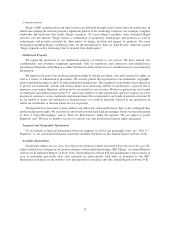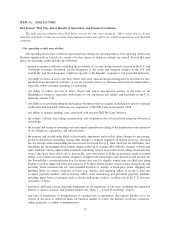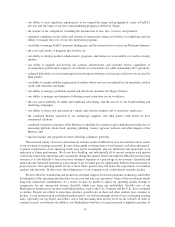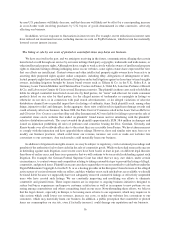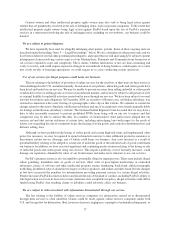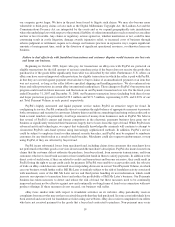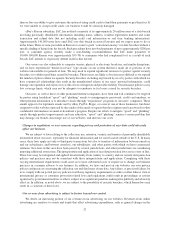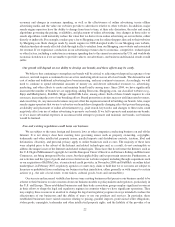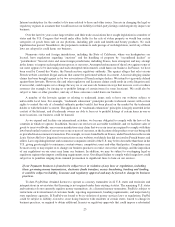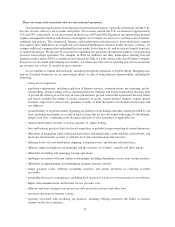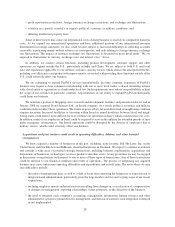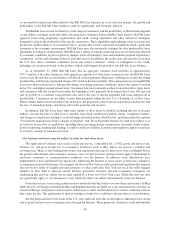eBay 2008 Annual Report Download - page 30
Download and view the complete annual report
Please find page 30 of the 2008 eBay annual report below. You can navigate through the pages in the report by either clicking on the pages listed below, or by using the keyword search tool below to find specific information within the annual report.economy and changes in consumer spending, as well as the effectiveness of online advertising versus offline
advertising media and the value our websites provide to advertisers relative to other websites. In addition, major
search engine operators have the ability to change from time to time, at their sole discretion, the rules and search
algorithms governing the pricing, availability, and placement of online advertising. Any changes in these rules or
search algorithms could materially reduce the value that we derive from online advertising on our websites, either
directly or indirectly. For example, retailers pay a fee to Shopping.com for online shoppers directed to their websites
by Shopping.com. Rule changes made by search engines in 2008 disrupted traffic to our Shopping.com website,
which in turn has adversely affected click-through traffic to retailers from our Shopping.com website and associated
fee revenue. If we experience a reduction in our advertising revenues due to economic, competitive, technological
or other factors, including a reduction in consumer spending due to the current recession in the U.S. and worldwide
economic slowdown or if we are unable to provide value to our advertisers, our business and financial results would
suffer.
Our growth will depend on our ability to develop our brands, and these efforts may be costly.
We believe that continuing to strengthen our brands will be critical to achieving widespread acceptance of our
services, and will require a continued focus on active marketing efforts across all of our brands. The demand for and
cost of online and traditional advertising have been increasing, and may continue to increase. Accordingly, we will
need to continue to spend substantial amounts of money on, and devote substantial resources to, advertising,
marketing, and other efforts to create and maintain brand loyalty among users. Since 2004, we have significantly
increased the number of brands we are supporting, adding Rent.com, Shopping.com, our classified websites (e.g.,
Kijiji and Marktplaats), StubHub, Skype and Bill Me Later, among others. Each of these brands requires its own
resources, increasing the costs of our branding efforts. Brand promotion activities may not yield increased revenues,
and even if they do, any increased revenues may not offset the expenses incurred in building our brands. Also, major
search engine operators that we use to advertise our brands have frequently-changing rules that govern their pricing,
availability and placement of online advertisement (e.g., paid search, keywords), and changes to these rules could
negatively affect our use of online advertising to promote our brands. If we fail to promote and maintain our brands,
or if we incur substantial expenses in an unsuccessful attempt to promote and maintain our brands, our business
would be harmed.
New and existing regulations could harm our business.
We are subject to the same foreign and domestic laws as other companies conducting business on and off the
Internet. It is not always clear how existing laws governing issues such as property ownership, copyrights,
trademarks and other intellectual property issues, parallel imports and distribution controls, taxation, libel and
defamation, obscenity, and personal privacy apply to online businesses such as ours. The majority of these laws
were adopted prior to the advent of the Internet and related technologies and, as a result, do not contemplate or
address the unique issues of the Internet and related technologies. Those laws that do reference the Internet, such as
the U.S. Digital Millennium Copyright Act and the European Union’s Directive on Distance Selling and Electronic
Commerce, are being interpreted by the courts, but their applicability and scope remain uncertain. Furthermore, as
our activities and the types of goods and services listed on our websites expand, including through acquisitions such
as our acquisition of Bill Me Later, a transactional credit provider, in November 2008 and StubHub, an online ticket
marketplace, in February 2007, regulatory agencies or courts may claim or hold that we or our users are subject to
licensure or prohibited from conducting our business in their jurisdiction, either generally or with respect to certain
actions (e.g., the sale of real estate, event tickets, cultural goods, boats and automobiles).
Our success and increased visibility has driven some existing businesses that perceive our business model to be
a threat to their business to raise concerns about our business models to policymakers and regulators, particularly in
the U.S. and Europe. These established businesses and their trade association groups employ significant resources
in their efforts to shape the legal and regulatory regimes in countries where we have significant operations. They
may employ these resources in an effort to change the legal and regulatory regimes in ways intended to reduce the
effectiveness of our businesses and the ability of users to use our products and services. In particular, these
established businesses have raised concerns relating to pricing, parallel imports, professional seller obligations,
stolen goods, copyrights, trademarks and other intellectual property rights, and the liability of the provider of an
22


